Suchergebnisse
"Anton Leist"
Titel: Why Participate in Pro-Environmental Action? Individual Responsibility in Unstructured Collectives
Autor: Anton Leist
Seite: 397-416
Abstract: The degradation of natural resources in the environment is, technically speaking, a form of depleting a public good. Public goods are notorious for free-riding among egoists, but the marginality of individual contributions provides no less an obstacle, both to moral duty and motivation. This article discusses the problems of minimized and missing causal involvement on the empirical side and, in the applicability of classical moral arguments, on the ethical side. It suggests that individual responsibility is derived on the basis of implicit advantage-taking from participation in collective action.
Titel: Comment on Anton Leist: Comment on Anton Leist. Potentials of Cooperation (Analyse & Kritik 01/2011)
Autor: Gebhard Kirchgässner
Seite: 509-516
Abstract: I first discuss two aspects of a social order and cooperation which might be of high relevance: the problem of a spontaneous emerging of a social order, and the relation between exchange and cooperation. In doing so, I also discuss the role of production in separating areas of cooperation from those of competition. Second, I look more closely at the motivations for cooperative behaviour. It is argued that of the four kinds of motivation mentioned by Leist only two, self-interest and altruism, are really necessary to explain cooperation.
Titel: Potentials of Cooperation
Autor: Anton Leist
Seite: 7-33
Abstract: Since Hobbes' Leviathan was published in 1651, the 'problem of order' has been known for some time. Despite this long gestation period for social theory even today we do not have a universally agreed upon answer to this 'problem'. One of the reasons behind this lacuna may be the overly dispersed work being done in the economic and sociological traditions. Whereas one tradition favours 'collective action' as a central answer, the other thinks of the problem itself being dissolved by the acceptance of 'socialized man'. Here, an attempt is made to offer the phenomenon of 'cooperation' as a promising middle ground for both traditions. To underline the importance of cooperation as an elementary social activity, first, cooperation is shown as working in tandem with its rival 'competition'. Secondly, several conceptual analyses of what is included in collective action and cooperation are offered. These analyses, thirdly, are deepened by an overview of the motivational bases potentially advancing cooperation. Overall, an awareness of the self-creating character of cooperation is explored, and put forward as the most feasible way of answering the classical problem of order.
Titel: Comment on Robert H. Myers: Finding Out What is Substantive in Cooperation
Autor: Anton Leist
Seite: 141-148
Abstract: Myers' offer of cooperation as a medicine for ailing moral theories is welcomed as potentially helpful, even if his handling of it is diagnosed as implicitly one-sided consequentialist. His search for an ethically "substantive way of engaging with others'' is shown as not coherent with his remarks on the tasks cooperation as an ethical concept has to fulfil. Instead, it is proposed that the concept be disentangled from the micro-problems Myers' wants it to solve, and that it be read more freely, from the perspective of Rawls' conception of cooperation.
Titel: Reply to Anton Leist: Keeping Constructivism in Its Place
Autor: Robert Myers
Seite: 149-153
Abstract: Leist worries that by tying the ideal of cooperation to the aim of promoting the good I exhibit a bias towards consequentialism, and that this in turn leads me to downsize the role to be played by the ideal of cooperation within moral theory. I maintain that no bias is exhibited towards consequentialism but acknowledge that realism is being favoured over constructivism. I further argue that the role assigned to the ideal of cooperation is as large as realism permits.
Titel: The Long Goodbye: On the Development of Critical Theory
Autor: Anton Leist
Seite: 331-354
Abstract: It is not easy to give up on a tradition that promises to rationalize, explain, and thereby ultimately help improve, society. This article narrates the history of Critical Theory in three stages, following the dynamics of its own self-criticism during distinct historical periods and within different societies. Horkheimer/Adorno, Habermas and Honneth are read as participating in a philosophical project of societal rationalism which can be criticized by appeal to a pragmatist view of social theories, and specifically the ’pragmatic maxim’. In spite of its post-metaphysical announcements, Critical Theory overextends itself when it seeks to reconcile fully the normative and the empirical. An alternative, and more explicitly ethical and empirically controllable, scheme for critical theories (plural!) is suggested.
Titel: Social Relations Instead of Altruistic Punishment
Autor: Anton Leist
Seite: 158-171
Abstract: Ernst Fehr's experimental research on altruistic behaviour aims at superseding the classical homo oeconomicus in micro-economic behaviour theory. This essay discusses Fehr's results from two points of view: rst, in regard to the understanding of social action associated with the term "altruism"; second, in regard to the 'anthropological' strategy of research that is based on the laboratory method. Against the emphasis on altruism it will be argued that it misleads into providing a distorted description of social acting, and that, due to insu cient clarity about motives for acting, Fehr's empirical results give evidence not of altruism but rather of phenomena of social recognition. The objection against the anthropological strategy will be that it makes visible only local phenomena within prevailing social conditions and that it thus assumes more than it explains.
Titel: Morality and Society - The True and the Nasty. Reply to Anton Leist: "For Society - Against Morality?" (ANALYSE & KRITIK 19, 213-228)
Autor: David Copp
Seite: 123-140
Abstract: This paper is a reply to Anton Leist's criticisms of the view I develop in my book "Morality, Normativity, and Society". Leist claims that my "standard-based" account of the truth conditions of moral propositions is incoherent. I argue that he is mistaken about this. Leist claims that my "society-centered" account of the justification of moral standards has "nasty" implications. In the course of answering this worry, I develop the idea of a "moral necessity". My theory implies that although moral propositions are metaphysically contingent, they are most likely morally necessary. I also explain that, despite its relativism, the society-centered view is quite compatible with the idea that there are certain "moral universals". Finally, Leist claims that the arguments I have given in favor of my view are unsuccessful. But it is a mistake to think that decisive arguments can be expected in this area. The most we can expect is a clear statement of the costs and benefits of a theory. I claim that my account of the nature and grounding of morality has important advantages over familiar alternatives.
Titel: For Society - Against Morality? On David Copp's Attempt to Put Society at the Centre of Ethics
Autor: Anton Leist
Seite: 213-228
Abstract: Morality and society in moral philosophy are rarely brought into direct contact, at least not at a fundamental level of justification. David Copp develops an account of practical and moral rationality that could constitute a radical change. According to Copp moral theory has to be 'society-centered' rather than focussing on the individual. This article is devoted to the moral content and structural features of a socially centered moral theory, and along those lines to its critical assessment. Concluding, it will seek to present an argument why moral philosophy ought not place society at the centre of its view.
Titel: Comment on Douglas MacLean
Autor: Anton Leist
Seite: 181-185
Abstract: Some goods cannot, according to MacLean, be dealt with adequately by cost-benefit analysis. An explanation for this thesis is given, linking these goods to the altruism implied in intimate social relations. MacLean's argument is then shown to be insufficient when extended to matters of public relevance. The integration of political values and economic costs should be possible, on a level doing justice to both.
Titel: Individuelles Handeln und Macht: Foucaults Herausforderung
Autor: Anton Leist
Seite: 170-183
Abstract: Foucault's twofold attack on the modern concept of power gives us something to think about. Backed by ingenious historical analyses he devises an idea of systemic an productive power, abstracted from the conceptual connections between power and individual power-sources, viz. power and restrictions of freedom. The article probes Foucault's historical sketches on these two tasks. It defends the less radical view of power as constraining interests and freedom.
Titel: Kollektive Güter und individuelle Verantwortung
Autor: Anton Leist
Seite: 179-196
Abstract: In acting within large groups the single actor typically suffers from the symptom of irrelevance of his contribution. A single contributory effect may be extremely small or, due to 'threshold effects', even non-existent. Given such conditions not only self-interested action, also purely altruistically motivated contribution seems to be rendered irrational. The article reasons that the famous 'principles of generalization' are of no help on this problem. However, a 'principle of division' could be used in show-ing that in many situations of collective action altruistically motivated contribution is rationally sound.
Titel: Replies to the Critics of A Theory of Social Action
Autor: Raimo Tuomela
Seite: 229-241
Abstract: The paper is a reply to the critical reviews of the author's "A Theory of Social Action" by Anton Leist, Marvin Belzer, and Julian Nida-Rümelin in this journal. As to Leist's main criticisms, which concern the notions of social action, social practical reasoning, individualism, and social norms, they are argued to be incorrect and unjustified. Belzer's criticisms are on the whole well taken, and in fact all of them have been noted by the author in his later work. Belzer does not, however, consider these newest analyses and improvements. Nida-Rümelin presents some comments on the relationships between collective preferences and weintentions. These points are correct.
Titel: Eine individualistische Theorie sozialen Handelns. Zu Raimo Tuomelas "A Theory of Social Action"
Autor: Anton Leist
Seite: 180-205
Abstract: This critical review concentrates on four important parts of Raimo Tuomela's analytical theory of social action. It examines the book's reconstructions of social action, of practical reasoning in this context, of social norms and it investigates its claim to a conceptual individualism. The result is critical in several aspects. Tuomela's most original idea in the analysis of joint action, that of we-intentions, is not broad enough to cover more than a part of social action in the commonly understood sense. His 'social' practical reasoning incorporates an implausible premiss. The game-theoretical reconstruction of social norms strikes one as unlikely to be fulfilled in social reality. Hardly any of these analyses back up the individualist claims of Tuomela's project.
Titel: G. A. Cohens materialistische Geschichtstheorie. Einige Einwände - Überblick zu einer Diskussion
Autor: Anton Leist
Seite: 131-158
Abstract: During the last years Anglosaxon discussion about Marx and Marxism has been characterized by an intensified interest in historical materialism as a general theory of history. The most extensive, careful and analytically rigorous among several new treatments is the one by G. A. Cohen, which is the subject of four critical articles in the present issue of ANALYSE & KRITIK. To make these articles and Cohen's project understandable to the German reader, an attempt is made in the following to summarize the main arguments of Cohen's defence of historical materialism and of the ensuing comprehensive and detailed discussion.
Titel: Zum Programm einer kritischen Sozialwissenschaft - Theorie der gerechten Gesellschaft und Ideologiekritik
Autor: Michael Baurmann / Anton Leist / Dieter Mans
Seite: 105-124
Abstract: Critical social science has to acknowledge that every fundamental critique of society implies the justification of alternative norms and institutions. Several current objections against such an explicitly normative understanding of critical social science are discussed. The following outline of a theory of a just society tries co meet two demands: the rational consensus of all individuals concerned and the satisfaction of individual interests. In societies characterized by class struggles, however, these two aims turn out co be incompatible. Therefore an ethical realist approach is offered which takes into account the clarification and normative reinterpretation of interests. The tools of analytic philosophy can be given new application in combina-tion with an analysis of interests under the title of a critique of ideology.
Titel: Zum Programm einer kritischen Sozialwissenschaft - Empirie und Theorie
Autor: Michael Baurmann / Anton Leist / Dieter Mans
Seite: 1-29
Abstract: The article argues for a synthesis between analytical philosophy and social sciences as relevant and necessary. The motivation and framework of such a synthesis is outlined on the basis of a critical social science. The authors illuminate such a perspective negatively in a critique of empirical and theoretical sociology, then positively in a clarification of the critical standpoint. Four theses, two under each aspect, are defended: 1. Concerning empirical social sciences: Neither the quantitative nor the qualitative paradigm of empirical social science is able to put forward adequate methods for social research. Instead, the development of reconstructive methods is proposed to combine the advantages and eliminate the disadvantages of the quantitative and qualitative paradigms. 2. Concerning theoretical sociology: Macrosociological theories tend to resist empirical corrobation. Pure theoretical and philosophical justification abounds instead. In this situation the tools of analytic theory of science are proposed in order to c1arify the necessary steps towards a further development of theories, which can be empirically tested. 3. Concerning the critique of society: A critical social science must incorporate a theory of a just society in order to analyse social institutions in a normative way. In this context an ethical realist approach is offered which tries to fulfil two conditions for sociologically relevant normative reasonings: satisfaction of individual interests and the rational consensus of all persons concerned. 4. Concerning critique of ideology: The tools of analytic philosophy can be given new application by combining them with an ana-lysis of interests under the tide of critique of ideology.
Titel: Equality and Merit. Through Experiments to Normative Justice
Autor: Anton Leist
Seite: 137-170
When we want to justify claims against one another, we discover that conceptual thought alone is not sufficient to legitimize property and income in the relative and proper proportions among members of a productive group. Instead, the basis for justification should also be seen in motivational states, validated less by rational thought than by an effective behaviour. To circumnavigate otherwise dangerously utopian claims to justice, the social sciences, and especially behavioural economics, are the most reliable basis for normative distributive justice. This article builds on recent findings of experiments, first of all in order to give proof of the extent to which a general behavioural tendency towards equality is widespread among people, and second of all in order to highlight ‘desert’ and ‘need’ as the crucial criteria of just distribution, which will then sum up to justified inequality in the economic sphere.
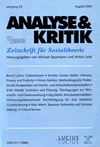
Environmental Justice: Empirical Concerns and Normative Reasoning
2014 (36) Heft 2
Guest-Editor: Gordon Walker
Editorial
In Why Things Matter to People Andrew Sayer reminds us that we are evaluative beings in which normative questions strongly figure in our everyday lives “because while we are capable and can flourish we are also vulnerable and susceptible to various kinds of loss or harm“ (Sayer 2011, 1). The ’environment’, understood in broad terms, provides one arena or frame within which evaluative questions necessarily figure, because of its centrality to our individual and collective flourishing or s...
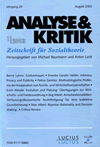
The Relevance of Ideal Justice
2011 (33) Heft 2
Guest-Editors: Lukas Meyer / Pranay Sanklecha
Editorial
Whether and how normative theorising can be relevant for guiding people’s actions is one of the classical questions of moral and political philosophy. Platon’s dialogues Politeia, Politikos and Nomoi provide fascinating discussions on the topic. Recently normative theorists have investigated some aspects of these questions under the title of ideal and non-ideal theorising—relying on a distinction that Rawls introduced in A Theory of Justice (1971) and made use of in his The Law of Peo...
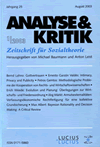
Work and Cooperation
2011 (33) Heft 1
Editorial
Both in social theories with the aim of looking into the creative core of society as well as in everyday politics, two intuitions often supplement each other. The first intuition, empirico-analytical, views common organization of work and production as being the very aim of society, and other parts of society being explicable from this. A second intuition, ethical or moral, holds the sphere of work to be the central site for diagnoses of a society's inherent justice. Both intuitions not only con...
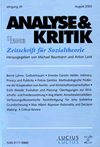
Ecological Goals and Liberal Ideals: Harmony or Conflict?
2006 (28) Heft 2
Guest-Editor: Thomas Schramme
Editorial
Liberty, equality, justice and solidarity are traditional political ideals of modern Western democracies. Different traditions and parties have supported different models in order to harmonise them. In contrast to the prevalence and long history of these values, ecological goals and needs have moved onto the political agenda fairly recently. Hence it should not come as a surprise that there is no consensus about the compatibility of ecological ambitions with common Western political ideals. Righ...
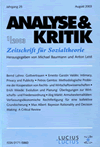
Ernst Fehr on Human Altruism. An Interdisciplinary Debate
2005 (27) Heft 1
Editorial
In the foregoing decade, two related developments in the behavioural sciences have drawn the attention of social scientists, particularly economists. The first is the use of laboratory experiments in the investigation of human behaviour. Although the use of such experiments has a longer history, only in the last decade has ’experimental economics’ become a sub-discipline of economics with which economists of just about all colours are familiar; indeed, experimental results regularly feed int...
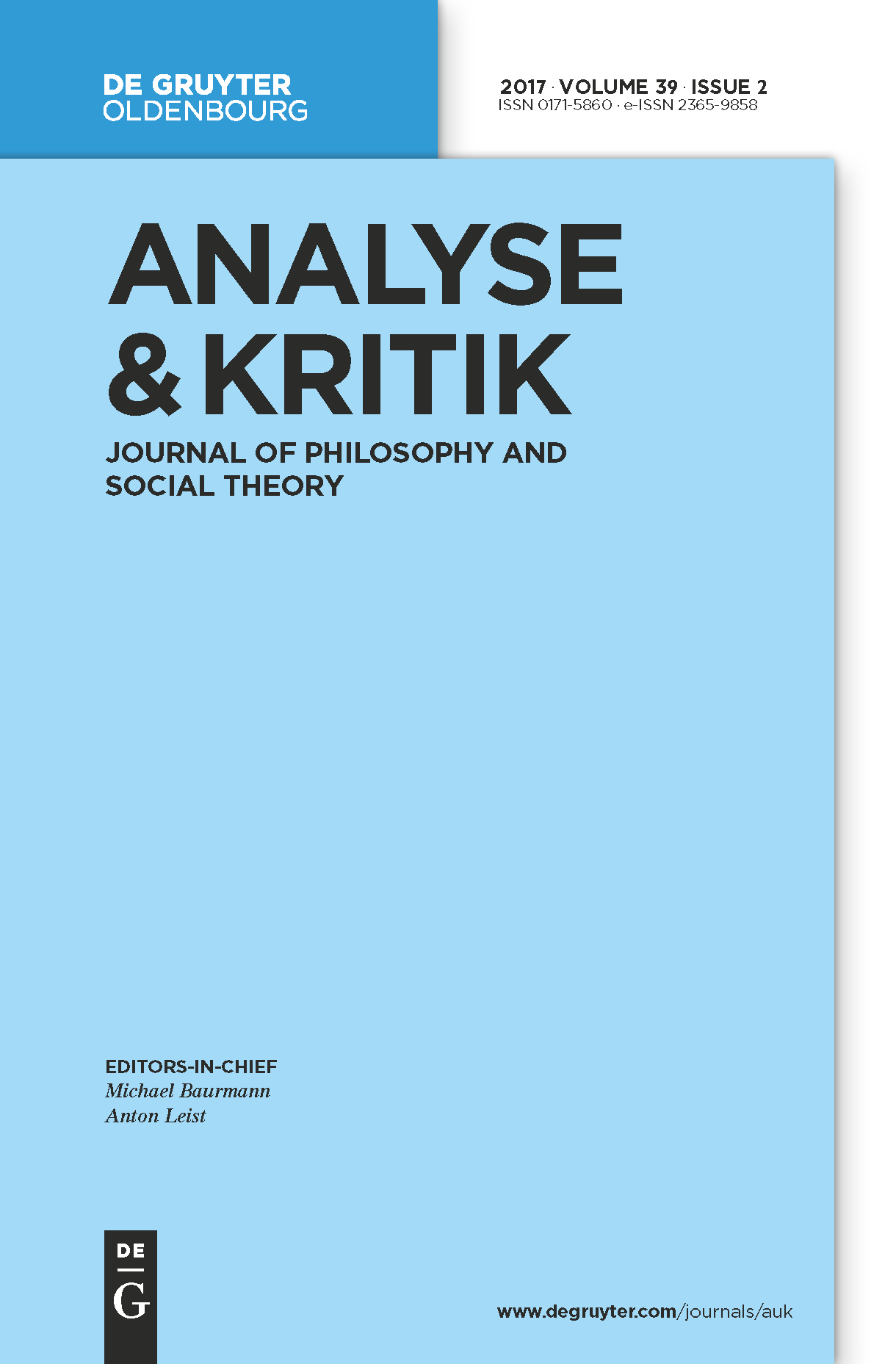
Focus: Experiments on Social Norms
2020 (42) Heft 1
Editorial
According to the classics of social theory—Durkheim, Weber, Parsons—social order cannot be based on individual utility seeking and external power, but requires ‘normative integration’. Even for large parts of the social sciences today it seems to be almost self-evident that social norms are the very ‘cement of society’ (Elster). The underlying assumption is that essential building blocks of social order in the form of individual cooperation, collective action and political governance...